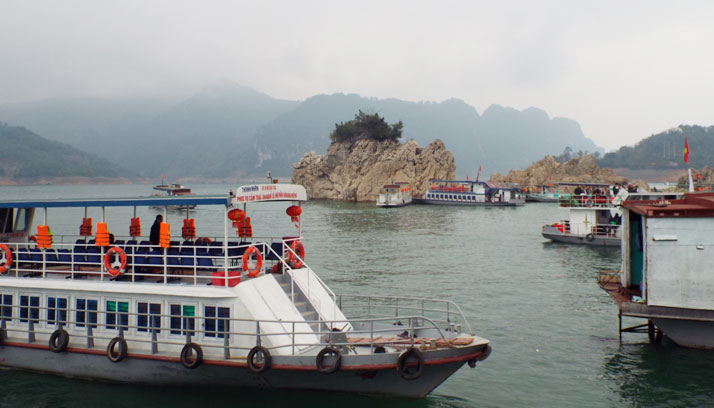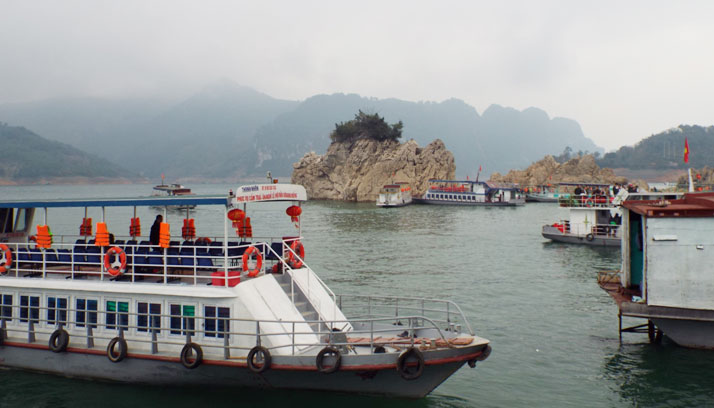
(HBO) - Hoa Binh Lake – an impossible-to-miss place, which is converging with natural beauty of water and clouds, charming scenery with many villages of bold cultural identity, friendly people, easy to close with many other tourist attractions. This place is hard to be ignored by visitors who want to enjoy, experience, especially in these summer days.

Hoa Binh Lake is a tourist attraction that
attracts visitors to come and experience.
Thung Nai is the ideal place for the tourists who
want to enjoy the wild beauty and fresh water scenery of Hoa Binh Lake, etc.
Thung Nai is located in the heart of the large Da River Lake, with rock islands
or bushy jungles. Thung Nai is beautiful to the heart, the surface of the lake
ripples early in the morning or the sunshine is covering the red water at the
sunset.
In Thung Nai, there is not only beautiful
landscapes but also many historical and cultural sites. You can go to Thac Bo
floating market on the weekend to feel the life of people living near the lake
area. Situated next to Thung Nai, the Temple of Thac Bo God - a spiritual
destination cannot be missed when visiting, sightseeing, and walking around Hoa
Binh Lake. Visiting Bo Temple - Thac Bo cave, visitors can learn about the
culture, living activities, production, life of local people, enjoying the
special taste of fish dishes of Da River, tasting the specialties of the
mountain forests, such as steamed chicken with lemon leaves, local pork grilled
with honey served on banana leaves, boiled bamboo shoots, steam rice, Tao Meo
wine, steamed forest vegetables with
fish sauce, etc. These bring unforgetable impression after the discovery of
Thac Bo Waterfall.
Another place is Dua Island, which is not far from
Bo Temple. This is one of the most beautiful islands in Hoa Binh area. Besides
Dua Island, tourists can choose the surrounding tourist destinations such as
Coi Xay Gio Island, Xanh Island, Ngoc Island, etc. to be able to experience
nature, culture, enjoying the food and specialities of the local host inviting,
such as smoked fish, wild vegetables with fish sauce, grilled pork, etc., which
are all clean and leave the unforgettable taste.
On the area of the lake, visitors can visit, stay
in the community tourism villages, which are still wild and preserved with
national identities such as Ngoi village, Ngoi Hoa commune; Ke village, Hien
Luong commune; Da Bia village, Tien Phong commune, etc.
A diverse chain of eco-tourism and resort destinations concentrated in Hoa Binh city and the districts of Tan Lac, Da Bac, and Luong Son… Along with the launch of several key high-quality resort tourism projects, these developments have reshaped the landscape and enhanced the appeal of Hoa Binh as a travel destination.
Boasting diverse terrain, a mild climate, and rich natural resources, Cao Phong district is increasingly asserting its place on Vietnam’s tourism map, attracting both domestic and foreign visitors. The district is renowned for its stunning landscapes, majestic mountains, a crystal-clear hydropower lake, and the unique cultural identity of local ethnic groups.
With its pristine landscapes, unique cultural heritage of Muong ethnic minority, and an expanding range of visitor experiences, Tan Lac district of Hoa Binh has fast become a captivating destination for both domestic and international tourists.
Until now, Sung village in Cao Son commune, Da Bac district remains the only Dao ethnic community in Hoa Binh province to develop a community-based tourism model. Beyond its untouched natural landscapes, cultural identity serves as the cornerstone attraction for visitors.
Alongside the diverse cultural identities of the Kinh, Muong, Tay, Thai, Dao, and Mong ethnic people, Hoa Binh province is also renowned as the "capital" of the northwestern Vietnamese cuisine, offering unique and distinctive dishes. At festivals, during Lunar New Year (Tet), or on significant family or community occasions, special dishes are prepared, leaving a lasting impression on visitors.
A Phong Linh (Yellow Tabebuia) flower garden in Thang village, Thach Yen commune, Cao Phong district is currently in full bloom, drawing a large number of visitors.



